|
|
|
Sort Order |
|
|
|
Items / Page
|
|
|
|
|
|
|
| Srl | Item |
| 1 |
ID:
100467
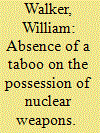

|
|
|
| 2 |
ID:
094272
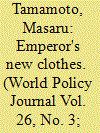

|
|
|
| 3 |
ID:
173030
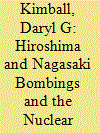

|
|
|
|
|
| Summary/Abstract |
The U.S. atomic bomb attack on the people of Hiroshima at 8:15 a.m. on August 6, 1945, and the second attack on the city of Nagasaki at 11:02 a.m. on August 9 killed and wounded hundreds of thousands of unsuspecting men, women, and children in a horrible blast of fire and radiation, followed by deadly fallout. In years that followed, those who survived—the hibakusha—suffered from the trauma of the experience and from the long-term effects of their exposure to radiation from the weapons.
|
|
|
|
|
|
|
|
|
|
|
|
|
|
|
|
| 4 |
ID:
061951
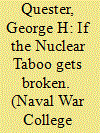

|
|
|
| 5 |
ID:
095357
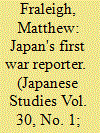

|
|
|
|
|
| Publication |
2010.
|
| Summary/Abstract |
The 1874 Taiwan Expedition was a watershed event for early Meiji journalism, for it was during this conflict that Kishida Gink? (1833-1905) became Japan's first war reporter. At a time when newspapers had only started to become a feature of daily life in Japan, Gink?'s pioneering coverage of the Taiwan campaign was an important demonstration of the newspaper's potential to the Meiji authorities, and his coverage likewise gave many readers their first concrete understandings of the reporter at work. This paper examines Gink?'s extensive writings on Taiwan with the goal of illuminating how the campaign, its setting, and the Taiwanese aborigines were understood by and represented to the Meiji reading public. It shows that more than simply conveying information about the Expedition to the reading public, Gink?'s reportage strove to situate the project as part of a broader colonial agenda that would impart 'civilization' to the indigenous population. In columns that stressed Japan's long-term strategic interests in the area, Gink? called upon his readers to imagine themselves as part of the enterprise.
|
|
|
|
|
|
|
|
|
|
|
|
|
|
|
|
| 6 |
ID:
146723
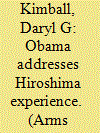

|
|
|
| 7 |
ID:
122403
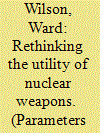

|
|
|
|
|
| Publication |
2012-13.
|
| Summary/Abstract |
The parameters of the discussion about nuclear weapons are well
known and appear to be relatively fixed. It seems as if there has
been little new on that front in forty years. Most civilian scholars
have lost interest in nuclear weapons and moved on to other topics. But
it is the habit of the military mind to learn from the past; even today
there are lessons to be learned from Cannae, Waterloo, and Vicksburg.
It will not surprise thoughtful military officers to find that the past has
something important and interesting to tell us about nuclear weapons.
|
|
|
|
|
|
|
|
|
|
|
|
|
|
|
|
| 8 |
ID:
100466
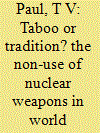

|
|
|
|
|
| Publication |
2010.
|
| Summary/Abstract |
The non-use of nuclear weapons since Hiroshima and Nagasaki in 1945 has emerged as a major puzzle in international politics. Traditional International Relations scholarship views this largely as a function of the deterrent relationship that emerged between the nuclear powers, especially during the Cold War era. The fact that nuclear weapons have not been used against non-nuclear states, despite temptations to use them, remains a challenge to the deterrence-only explanation. More normatively oriented scholars have argued that a taboo has emerged against the non-use of nuclear weapons. Nina Tannenwald's book, The Nuclear Taboo is the most comprehensive study on this subject which relies on constructivist logic of inter-subjective taboo-like prohibition in accounting for the puzzle. While I see much merit in Tannenwald's empirical case studies, it is far-fetched to call the non-use largely a function of a taboo-like prohibition. For, taboos by their very nature forbid discussions of their breaking, whereas nuclear states have national military strategies that call for nuclear use under certain circumstances. They have also in many crises situations considered the use of nuclear weapons. I have argued in my book, The Tradition of Non-use of Nuclear Weapons (Stanford University Press, 2009), that a more modest tradition can be given partial credit for the absence of nuclear attacks on non-nuclear states. The tradition emerged because of a realisation of the horrendous effects of nuclear attack (a material fact) which generated reputation costs for a potential user. These reputation costs in turn generated self-deterrence which has helped to create a tradition which is partially restraining nuclear states from using their weapons for anything other than existential deterrence. Unlike Tannenwald, I contend that the tradition is not a strict taboo and hence it can be altered if material and political circumstances compel nuclear states to do so. The recent policy changes that have taken place in nuclear powers such as the US, Russia, UK, and France do not augur well for the tradition as the conditions for atomic use have been expanded to include prevention, pre-emption and other non-proliferation objectives involving rogue states and terrorist groups.
|
|
|
|
|
|
|
|
|
|
|
|
|
|
|
|
| 9 |
ID:
184907
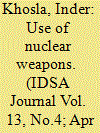

|
|
|
| 10 |
ID:
113053
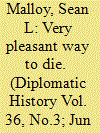

|
|
|
|
|
| Publication |
2012.
|
| Summary/Abstract |
One of the distinguishing characteristics of the atomic bombs used against Hiroshima and Nagasaki was their accompanying radiation effects. The effects of ionizing radiation on the bomb's survivors have been the subject of intense study and discussion since August 1945. This article examines a related question that has received surprisingly little scholarly attention: what did American scientists and policy makers know about radiation effects prior to the use of the bomb? In making the decision, did American leaders understand that the atomic bombs used against Japanese cities and civilians would have lingering and deadly effects in some ways analogous to chemical or biological weapons?
A careful study of pre-Hiroshima knowledge of radiation effects in the United States makes it clear that most of the immediate and long term biological effects of radiation on the victims of the bomb were, in fact, predictable at the time of the A-bomb decision. While the pre-Hiroshima understanding of radiation among Manhattan Project scientists was far from perfect, that the bomb would produce lingering and lethal effects was suggested as early as 1940. Extensive research carried out by Manhattan Project scientists and physicians during World War II, including both human and animal experiments, greatly expanded knowledge of the biological effects of ionizing radiation.
Despite the intense wartime study of radiation effects in the United States, this knowledge played little or no role in the decision to use the atomic bomb. The policy of compartmentalization and secrecy enforced by Manhattan Project director General Leslie R. Groves, combined with the single-minded drive at Los Alamos to build a working bomb, meant that few even inside the Manhattan Project itself were aware of, or interested in, the emerging body of knowledge on radiation effects generated during the war. The high-level American leaders who made the final decisions about the bomb, including President Harry S. Truman, Secretary of State James F. Byrnes, and Secretary of War Henry L. Stimson, were never informed that the weapon would continue to sicken and kill its victims long after use.
For all of the outstanding technical successes of the Manhattan Project, the policy of wartime compartmentalization and postwar denial with respect to radiation effects ultimately served neither American leaders nor the many victims of the bomb in Japan. In addition to analyzing the evidence of pre-Hiroshima knowledge of radiation effects in the United States, this article explores the disconnect between scientific knowledge and political decision making with respect to the atomic bomb that would continue into the Cold War.
|
|
|
|
|
|
|
|
|
|
|
|
|
|
|
|
| 11 |
ID:
125337
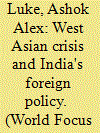

|
|
|
|
|
| Publication |
2013.
|
| Summary/Abstract |
As a newly independent nation in 1947 India set out to engage with the rest of the world sharing the vision of a peaceful coexistence. The colonial nightmares together with the devastating events in Hiroshima and Nagasaki shaped some of the principles and objectives of its foreign policy such as world peace, nuclear disarmament, anti imperialism, anti colonialism, and anti racism.
|
|
|
|
|
|
|
|
|
|
|
|
|
|
|
|
|
|
|
|
|